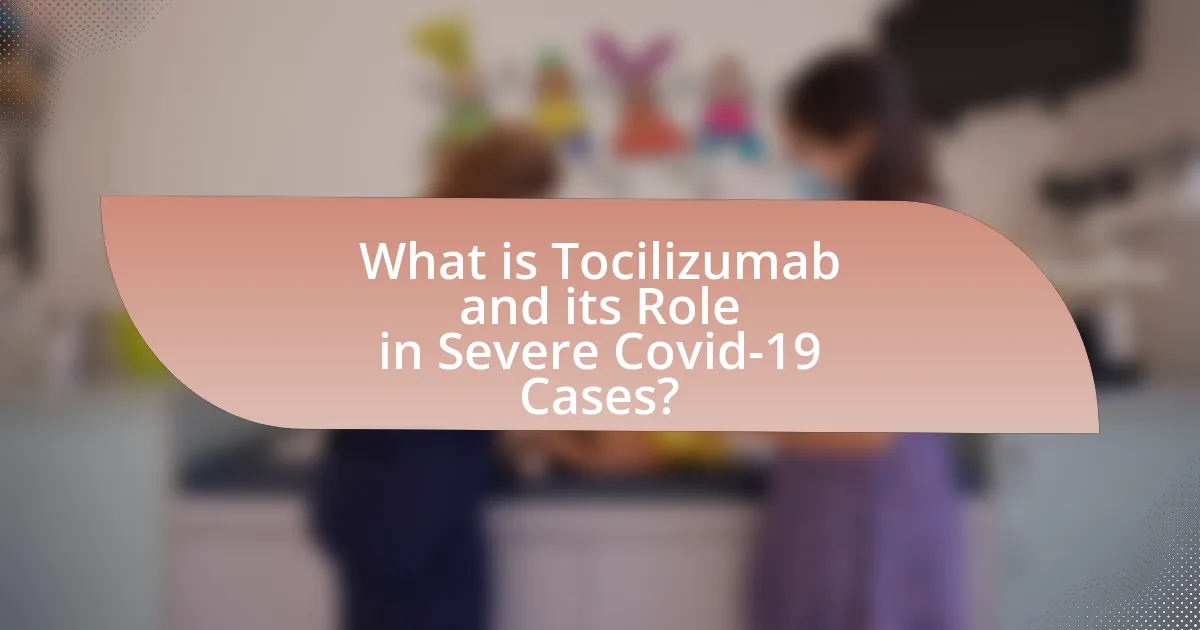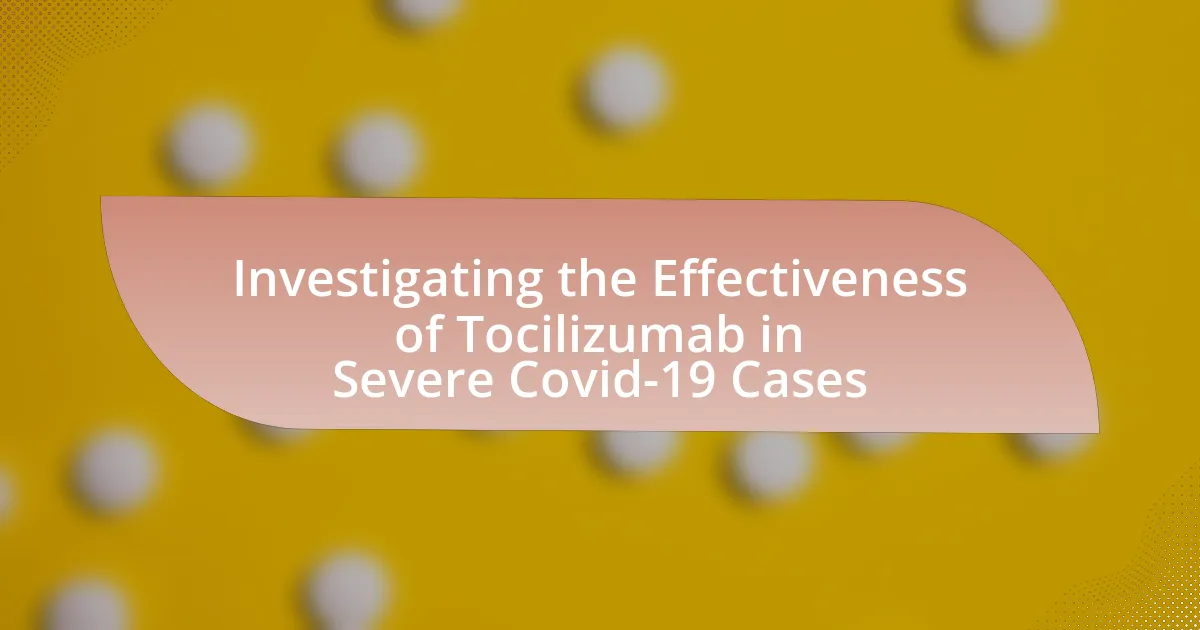Tocilizumab is a monoclonal antibody that targets the interleukin-6 (IL-6) receptor and is primarily used to treat autoimmune diseases and certain cancers. In the context of severe COVID-19 cases, Tocilizumab plays a vital role in mitigating the hyper-inflammatory response known as cytokine storm, which can lead to respiratory failure and increased mortality. Clinical studies, including the RECOVERY trial, have demonstrated that Tocilizumab significantly reduces mortality and the need for mechanical ventilation in hospitalized patients with severe COVID-19, making it a critical therapeutic option. The article will explore Tocilizumab’s mechanisms of action, its impact on cytokine levels, indications for use, clinical evidence supporting its effectiveness, potential side effects, and best practices for administration in treating severe COVID-19.

What is Tocilizumab and its Role in Severe Covid-19 Cases?
Tocilizumab is a monoclonal antibody that targets the interleukin-6 (IL-6) receptor, used primarily to treat autoimmune diseases and certain types of cancer. In severe COVID-19 cases, Tocilizumab plays a critical role by mitigating the hyper-inflammatory response known as cytokine storm, which can lead to respiratory failure and increased mortality. Clinical studies, such as the RECOVERY trial, have demonstrated that Tocilizumab significantly reduces the risk of death and the need for mechanical ventilation in hospitalized patients with severe COVID-19, thereby supporting its use as a therapeutic option in this context.
How does Tocilizumab function in the immune response?
Tocilizumab functions in the immune response by inhibiting the interleukin-6 (IL-6) receptor, which plays a crucial role in inflammatory processes. By blocking IL-6 signaling, Tocilizumab reduces the inflammatory response associated with severe conditions such as cytokine release syndrome, commonly observed in severe COVID-19 cases. Clinical studies have demonstrated that patients treated with Tocilizumab show improved outcomes, including reduced mortality rates and shorter hospital stays, highlighting its effectiveness in modulating the immune response during severe infections.
What are the mechanisms of action of Tocilizumab?
Tocilizumab acts primarily as an interleukin-6 (IL-6) receptor antagonist, inhibiting the pro-inflammatory effects of IL-6 in the body. By binding to both soluble and membrane-bound IL-6 receptors, Tocilizumab prevents IL-6 from exerting its biological effects, which include promoting inflammation and immune response. This mechanism is particularly relevant in conditions characterized by excessive inflammation, such as severe COVID-19, where IL-6 levels are often elevated. Clinical studies have demonstrated that Tocilizumab can reduce the need for mechanical ventilation and improve survival rates in patients with severe COVID-19, supporting its role in managing hyperinflammatory responses associated with the disease.
How does Tocilizumab impact cytokine levels in Covid-19 patients?
Tocilizumab significantly reduces cytokine levels in COVID-19 patients, particularly interleukin-6 (IL-6), which is a key mediator of the inflammatory response associated with severe cases of the disease. Clinical studies have demonstrated that Tocilizumab, an IL-6 receptor antagonist, effectively lowers elevated IL-6 levels, leading to a decrease in systemic inflammation and improvement in clinical outcomes. For instance, a study published in the New England Journal of Medicine found that Tocilizumab administration resulted in a notable reduction in IL-6 levels and was associated with improved respiratory function in hospitalized patients with severe COVID-19 pneumonia.
What are the indications for using Tocilizumab in Covid-19 treatment?
Tocilizumab is indicated for the treatment of severe COVID-19 in patients who exhibit rapid respiratory deterioration and elevated inflammatory markers, such as C-reactive protein (CRP). This monoclonal antibody targets the interleukin-6 (IL-6) receptor, which plays a crucial role in the inflammatory response associated with severe COVID-19. Clinical studies, including the RECOVERY trial, have demonstrated that Tocilizumab can reduce the risk of progression to mechanical ventilation or death in hospitalized patients with severe disease and systemic inflammation.
Which patient profiles are most suitable for Tocilizumab therapy?
Patients with severe COVID-19 who exhibit elevated inflammatory markers, such as C-reactive protein (CRP) and interleukin-6 (IL-6), are most suitable for Tocilizumab therapy. Clinical studies have shown that Tocilizumab, an IL-6 receptor antagonist, can reduce inflammation and improve outcomes in these patients. For instance, a study published in the New England Journal of Medicine demonstrated that Tocilizumab significantly decreased the risk of intubation or death in hospitalized patients with severe COVID-19 and elevated CRP levels. Additionally, patients who are on supplemental oxygen or mechanical ventilation and have a high inflammatory response are also considered appropriate candidates for this therapy.
What criteria determine the severity of Covid-19 that warrants Tocilizumab use?
The criteria that determine the severity of Covid-19 warranting Tocilizumab use include the presence of severe pneumonia, significant respiratory distress, and elevated inflammatory markers such as C-reactive protein (CRP) or interleukin-6 (IL-6). Specifically, Tocilizumab is indicated for patients exhibiting rapid clinical deterioration, particularly those requiring supplemental oxygen or mechanical ventilation, alongside high levels of inflammatory cytokines. Clinical guidelines, such as those from the National Institutes of Health, recommend Tocilizumab for patients with severe Covid-19 who meet these criteria, emphasizing its role in mitigating hyperinflammation associated with the disease.
What clinical evidence supports the use of Tocilizumab in severe Covid-19 cases?
Clinical evidence supporting the use of Tocilizumab in severe Covid-19 cases includes findings from randomized controlled trials, such as the RECOVERY trial, which demonstrated that Tocilizumab significantly reduced mortality and the need for mechanical ventilation in hospitalized patients with severe Covid-19. In this trial, patients receiving Tocilizumab had a 14% lower risk of death at 28 days compared to those receiving standard care alone. Additionally, the COVACTA trial showed that Tocilizumab improved clinical outcomes in hospitalized patients with severe Covid-19 pneumonia, leading to a higher likelihood of discharge from the hospital. These studies provide robust evidence that Tocilizumab can be an effective treatment option for severe Covid-19 cases.
What have recent studies revealed about Tocilizumab’s effectiveness?
Recent studies have shown that Tocilizumab is effective in reducing mortality and improving outcomes in severe COVID-19 cases. For instance, a study published in the New England Journal of Medicine demonstrated that Tocilizumab significantly decreased the risk of death in hospitalized patients with severe pneumonia due to COVID-19, with a 28% reduction in mortality compared to standard care. Additionally, the RECOVERY trial confirmed that Tocilizumab, when administered alongside standard treatment, led to faster recovery times and reduced the need for mechanical ventilation in patients with severe disease. These findings collectively support the use of Tocilizumab as a critical therapeutic option in managing severe COVID-19.
How do clinical trial results compare to standard Covid-19 treatments?
Clinical trial results indicate that Tocilizumab, an interleukin-6 inhibitor, shows improved outcomes in severe Covid-19 cases compared to standard treatments such as corticosteroids alone. In a study published in the New England Journal of Medicine, patients receiving Tocilizumab had a 14% higher chance of recovery and a significant reduction in mortality rates compared to those treated with standard care. This evidence suggests that Tocilizumab may enhance the effectiveness of existing Covid-19 treatment protocols, particularly in patients experiencing severe inflammatory responses.
How does Tocilizumab compare to other treatments for severe Covid-19?
Tocilizumab is an effective treatment for severe Covid-19, particularly in patients with elevated inflammatory markers. Clinical studies, such as the RECOVERY trial, demonstrated that Tocilizumab significantly reduced mortality and the need for mechanical ventilation compared to standard care alone. In this trial, patients receiving Tocilizumab had a 14% lower risk of death at 28 days compared to those who did not receive the drug. Additionally, Tocilizumab has been shown to improve clinical outcomes when compared to other treatments like corticosteroids, which primarily reduce inflammation but do not target the underlying immune response as specifically as Tocilizumab does. Thus, Tocilizumab offers a distinct advantage in managing severe Covid-19 by addressing both inflammation and immune dysregulation.
What are the advantages of Tocilizumab over corticosteroids?
Tocilizumab offers several advantages over corticosteroids in the treatment of severe COVID-19 cases, primarily through its targeted mechanism of action. Unlike corticosteroids, which broadly suppress the immune response, Tocilizumab specifically inhibits interleukin-6 (IL-6), a cytokine involved in the inflammatory response associated with severe COVID-19. This targeted approach can lead to a more effective reduction in inflammation without the extensive immunosuppression caused by corticosteroids.
Clinical studies, such as the COVACTA trial, have demonstrated that Tocilizumab can improve clinical outcomes in hospitalized patients with severe COVID-19 pneumonia, showing a reduction in the need for mechanical ventilation and a decrease in mortality rates compared to standard care, which often includes corticosteroids. Additionally, Tocilizumab has a faster onset of action in alleviating symptoms related to cytokine release syndrome, providing timely intervention in critical cases.
How does Tocilizumab’s efficacy measure against antiviral therapies?
Tocilizumab’s efficacy in treating severe COVID-19 cases is primarily focused on its role as an immunomodulator rather than a direct antiviral therapy. Studies indicate that Tocilizumab, an IL-6 receptor antagonist, can reduce inflammation and improve outcomes in patients experiencing cytokine storms, which are common in severe cases. In contrast, antiviral therapies aim to inhibit viral replication directly. For instance, a clinical trial published in the New England Journal of Medicine demonstrated that Tocilizumab significantly improved clinical outcomes compared to standard care, while antiviral treatments like remdesivir showed varying degrees of effectiveness in reducing viral load but did not specifically address the inflammatory response. Thus, Tocilizumab’s efficacy is measured more in terms of managing the immune response rather than directly combating the virus, highlighting its complementary role alongside antiviral therapies in treating severe COVID-19.
What are the potential side effects and risks associated with Tocilizumab?
Tocilizumab can cause several potential side effects and risks, including increased risk of infections, gastrointestinal perforations, liver enzyme elevation, and allergic reactions. In clinical studies, patients receiving Tocilizumab have reported serious infections such as pneumonia and sepsis, which are significant concerns given the immunosuppressive nature of the drug. Additionally, liver function tests may show elevated levels of transaminases, indicating potential liver damage. The risk of gastrointestinal perforation is particularly noted in patients with a history of diverticulitis. These side effects underscore the importance of monitoring patients closely during treatment with Tocilizumab, especially in severe cases of COVID-19.
What are the common adverse reactions observed in patients?
Common adverse reactions observed in patients receiving Tocilizumab for severe COVID-19 include infections, gastrointestinal perforations, liver enzyme elevations, and hypersensitivity reactions. In clinical studies, approximately 10-20% of patients experienced serious infections, highlighting the immunosuppressive effects of the drug. Additionally, liver enzyme elevations were reported in about 5-10% of cases, indicating potential hepatotoxicity. These reactions underscore the importance of monitoring patients closely during treatment.
How can healthcare providers mitigate risks when administering Tocilizumab?
Healthcare providers can mitigate risks when administering Tocilizumab by conducting thorough patient assessments, monitoring for potential side effects, and ensuring appropriate dosing. Thorough patient assessments include evaluating the patient’s medical history, current medications, and any pre-existing conditions that may increase the risk of adverse effects. Monitoring for side effects, such as infections or liver enzyme elevations, is crucial, as Tocilizumab can suppress the immune system. Additionally, adhering to recommended dosing guidelines, as established in clinical trials, helps minimize the risk of complications. For instance, studies have shown that proper dosing correlates with improved outcomes and reduced adverse events in patients with severe COVID-19.
What are the guidelines for administering Tocilizumab in clinical settings?
Tocilizumab should be administered in clinical settings according to specific guidelines established for its use in severe COVID-19 cases. The recommended dosage is typically 8 mg/kg, administered as an intravenous infusion over 60 minutes, with a maximum single dose of 800 mg. It is crucial to monitor patients for signs of infection prior to administration, as Tocilizumab can increase the risk of serious infections. Additionally, liver function tests should be conducted, and the drug should not be given to patients with active infections or those with a history of hypersensitivity to the drug. These guidelines are supported by clinical studies, including the RECOVERY trial, which demonstrated the efficacy of Tocilizumab in reducing mortality in hospitalized patients with severe COVID-19.
What dosage and administration protocols are recommended?
The recommended dosage of Tocilizumab for severe COVID-19 cases is 8 mg/kg administered as a single intravenous infusion, with a maximum dose of 800 mg. This protocol is based on clinical trials demonstrating that this dosage effectively reduces inflammation and improves outcomes in hospitalized patients. The administration should occur over a period of 60 minutes, and if necessary, a second dose may be given after 8 to 24 hours, depending on the patient’s clinical response and the presence of ongoing severe symptoms. These guidelines are supported by data from studies such as the COVACTA trial, which highlighted the efficacy of Tocilizumab in reducing the need for mechanical ventilation and improving survival rates in critically ill patients.
How should patient monitoring be conducted during Tocilizumab treatment?
Patient monitoring during Tocilizumab treatment should include regular assessments of vital signs, laboratory tests, and clinical symptoms. Specifically, healthcare providers must monitor for signs of infection, liver function tests, and complete blood counts to detect any adverse effects or complications associated with the treatment. The American College of Rheumatology guidelines recommend checking liver enzymes and blood cell counts before starting treatment and periodically thereafter, as Tocilizumab can affect liver function and immune response. Additionally, monitoring should include evaluating the patient’s respiratory status and overall clinical condition to ensure effective management of severe COVID-19 symptoms.
What future research is needed to further understand Tocilizumab’s role in Covid-19?
Future research is needed to evaluate the long-term effects and optimal dosing strategies of Tocilizumab in Covid-19 patients. Clinical trials should focus on diverse populations, including those with varying comorbidities, to assess the drug’s efficacy across different demographics. Additionally, studies should investigate the mechanisms of action of Tocilizumab in the context of Covid-19, particularly its impact on inflammatory pathways and immune response. Evidence from the RECOVERY trial indicates that Tocilizumab reduces mortality in hospitalized patients requiring respiratory support, highlighting the necessity for further exploration of its role in early intervention and combination therapies.
What unanswered questions remain regarding Tocilizumab’s long-term effects?
Unanswered questions regarding Tocilizumab’s long-term effects include the potential for long-term immunosuppression and the risk of opportunistic infections. Research indicates that while Tocilizumab is effective in reducing inflammation in severe COVID-19 cases, its impact on the immune system over extended periods remains unclear. Studies have shown that prolonged use of immunosuppressive therapies can lead to increased susceptibility to infections, but specific data on Tocilizumab’s long-term safety profile is still lacking. Additionally, the long-term effects on organ function and the potential for chronic side effects, such as cardiovascular issues or malignancies, have not been fully explored in clinical trials.
How can ongoing studies improve treatment protocols for severe Covid-19?
Ongoing studies can improve treatment protocols for severe Covid-19 by providing evidence-based insights into the efficacy and safety of existing and novel therapies, such as Tocilizumab. Research has shown that Tocilizumab, an interleukin-6 receptor antagonist, can reduce mortality and the need for mechanical ventilation in patients with severe Covid-19, as demonstrated in the RECOVERY trial, which reported a 29% reduction in mortality among patients receiving the drug compared to standard care. By continuously evaluating patient outcomes, dosing strategies, and combination therapies through clinical trials, ongoing studies can refine treatment protocols, ensuring they are tailored to the evolving understanding of Covid-19 pathophysiology and patient responses.
What best practices should clinicians follow when using Tocilizumab for Covid-19?
Clinicians should follow specific best practices when using Tocilizumab for Covid-19, including assessing eligibility based on clinical guidelines, monitoring for potential side effects, and ensuring timely administration. The National Institutes of Health (NIH) recommends Tocilizumab for patients with severe Covid-19 who exhibit rapid respiratory decline and elevated inflammatory markers. Clinicians must also evaluate the patient’s risk factors for complications, such as obesity or diabetes, as these can influence treatment outcomes. Regular monitoring of liver enzymes and blood counts is essential to detect adverse effects early. Additionally, clinicians should consider the timing of administration, ideally within 24 to 48 hours of hospitalization, to maximize the drug’s efficacy in reducing inflammation and improving respiratory function.


